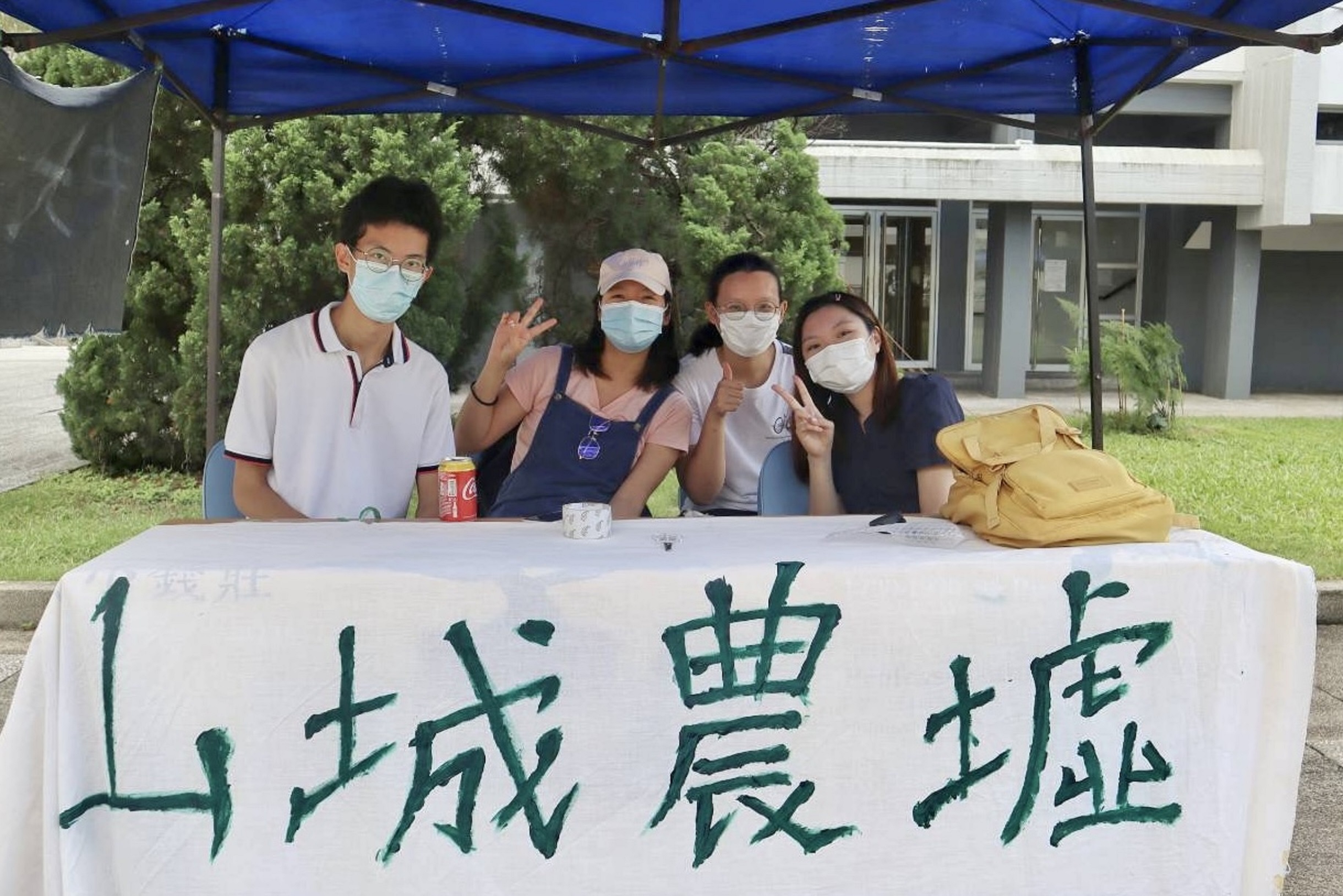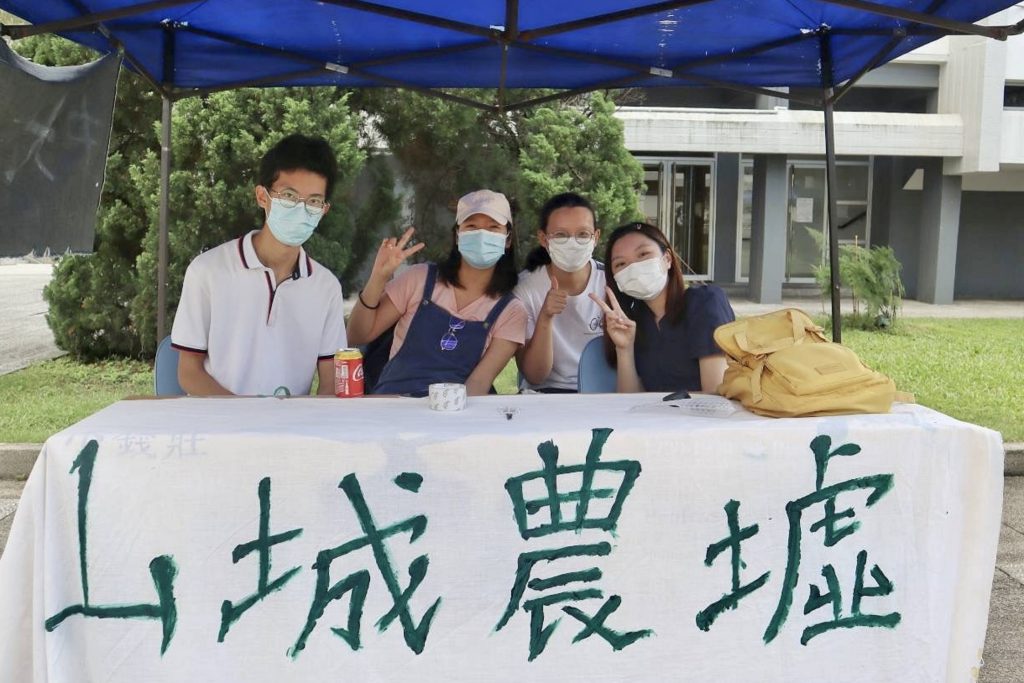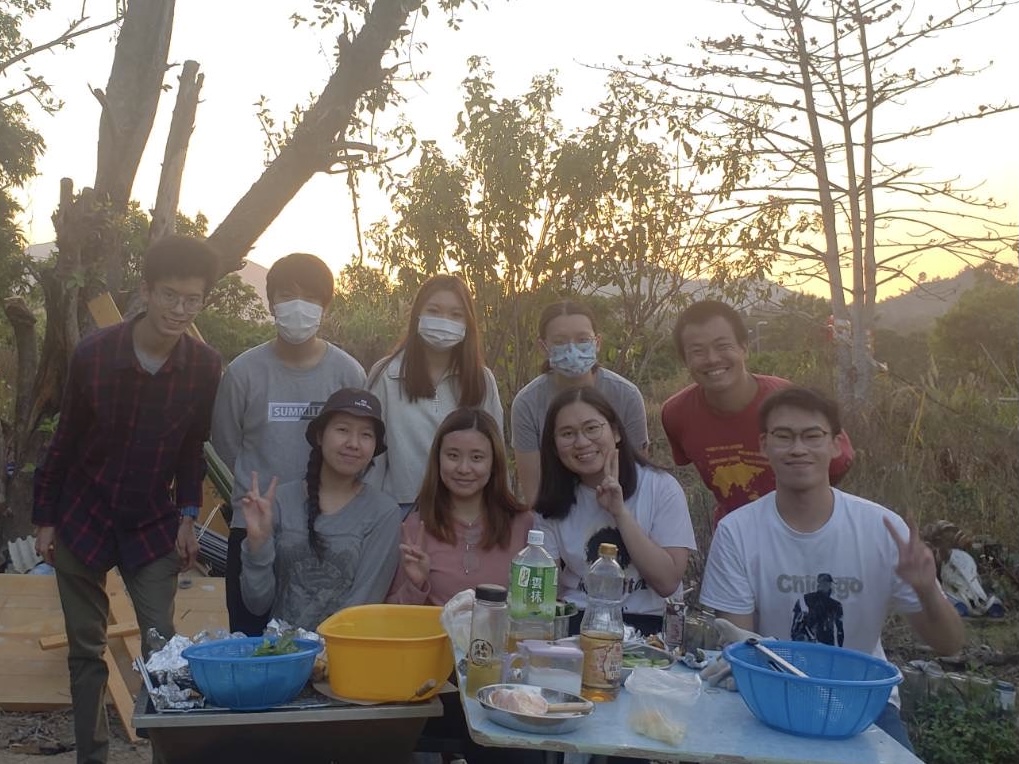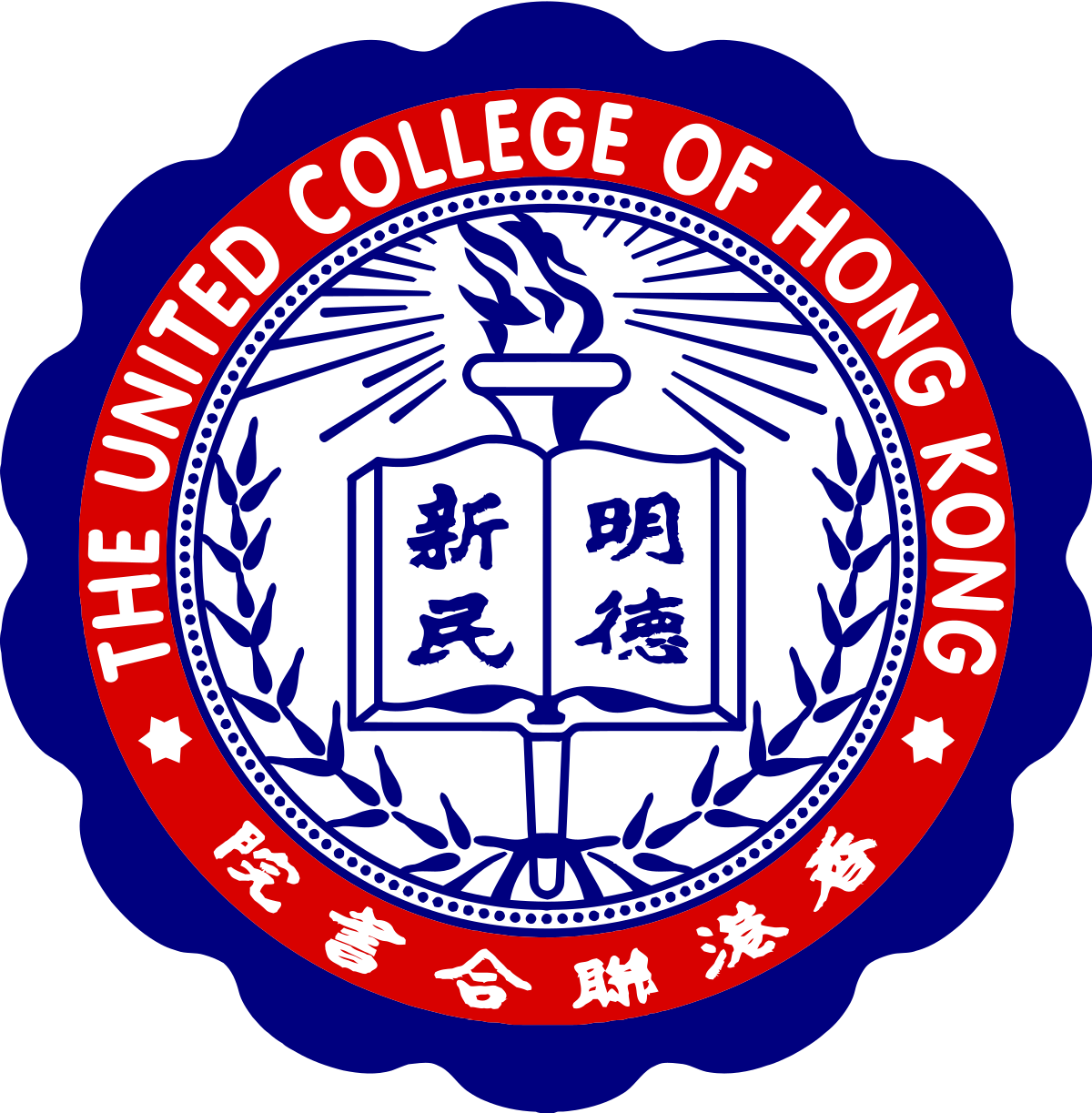CU Agricultural Development Group Brings Agriculture Back to Students’ Horizons

English Translator: Lee Pui Yee Ruby (ENGE/1)
CUHKers Promoting Agriculture
Earlier this year, the serious epidemic has seen a surge in Covid-19 cases among cross-border truck drivers, affecting vegetable supplies to Hong Kong. The transport disruptions at the city’s border with mainland China have hiked up vegetable prices. Has this drawn your attention to local agricultural produce? Many students born and bred in Hong Kong are not well aware of the close connection between agriculture and daily life. Yet a group of CUHK students have determined to promote farming culture and founded the Agricultural Development Group (AGRO) on campus. Organising different activities, the group has brought local farming businesses within students’ reach. Three former committee members, Carol Chan Ho Ching, Alex Leung Cheuk Yin and a UC student Teddy Leung Ting Wan, share their experiences of organising activities last year with us.
Alex and Teddy joined AGRO by chance, as they commented. Attracted by the rooftop farming programme, Alex took the initiative to contact members of AGRO to gain extracurricular experience at the university, although he first experienced gardening back in high school. Alex was not sure if AGRO was what he was looking for at the very beginning, but he eventually turned out to be one of the non-committee members, who is eager to help with the committee’s affairs and actively involved in AGRO’s organisation of the activities today. For a similar reason, Teddy joined AGRO when she was a freshman. Having watched a promotional video produced by AGRO, this young girl became highly interested in the vegetable bouquets for graduates, in addition to cultivation. Teddy chuckled that she is “lazy and doesn’t want a busy committee”. With a great passion for cooking and consciousness about food quality, she decided to join AGRO.
Carol is also intrigued by the promotional video. After finishing her HKDSE examination, Carol joined agricultural activities and watched the promotional video introduced by the other participants. She was attracted by the cultivation activity in the video clip and later joined the group. To support the agricultural industry as a student, Carol became one of the committee members in the hope of arousing the awareness of the local agricultural industry among both students and teaching staff.
Colourful Events
Every year, AGRO organises a variety of activities to promote the local agricultural industry, one of which is the organisation of the CUAgro Farming Team. AGRO borrows the farmlands behind UC Adam Schall Residence and equally allocates them to about twenty people for them to freely farm on. Alex has expected the activity to offer students enjoyment of cultivation and provide them with a platform to share their agriculture experience and knowledge. This practice of exchange, he believes, will help establish a farming community at CUHK. Last year, the participants succeeded in growing pumpkins, while the participants are growing plants like tomatoes and carrots this year.
The “Vegetable Bouquet for Photo Days” is another signature event of AGRO. On the eve of Photo Day, the committee members order fresh local vegetables from farmers and make vegetable bouquets. Teddy found the making of vegetable bouquets meaningful and enjoyed the event very much. She expressed that typical flower bouquets cannot last long despite their natural beauty. However, with the assistance of a floral designer, the arrangement and the colours of the vegetable bouquets are carefully designed to cater to graduates’ needs in taking good pictures. Apart from serving as an adornment in photographs, each bouquet also offers local vegetables at a reasonable price. Purchasing a vegetable bouquet sort of kills two birds with one stone. Currently, not many companies make vegetable bouquets in the city. While Teddy hopes more students can learn about AGRO through the event, Carol expects to promote and further popularise vegetable bouquets among Hong Kong people.
Every second week, AGRO holds CUHK Farmers Market at Cultural Square. After the invitation of tenders from the committee members, 4 to 5 farmers will participate every time. The attending farmers will prepare a wide variety of fresh vegetables and fruits for sale; the committee members will arrange for the booths. The transportation of vegetable supplies, the setting up and the packing of the tents all require enormous physical strength and endurance every time. Many students and staff know about the Farmers Market. AGRO estimated that almost a thousand people participated last year – Alex and Teddy considered it a success. Teddy took her hostel life as an example. “You cannot skip cooking by yourself when living in a hostel. While the supermarket offers, unfortunately, a limited choice of vegetables, the Farmers Market is what we need.” Teddy is delighted to see staff and students are willing to share their purchases from the Farmers Market, and she shares the locally-grown organic agricultural products with her friends, too.
 Six sessions of CUHK Farmers Market are held at the Cultural Square and spaces outside NA Library. From the left: Alex Leung, Teddy Leung, Michelle Chow, Carol Chan
Six sessions of CUHK Farmers Market are held at the Cultural Square and spaces outside NA Library. From the left: Alex Leung, Teddy Leung, Michelle Chow, Carol Chan
AGRO has received support from Mr Johnny H L Lau (Ah Lung) for years. With an extensive social network in the farmer community and ample experience in the agricultural industry, Ah Lung always offers students useful information about agriculture and connections with the farmer community. Carol mentioned how Ah Lung suggested she find other farms for allotment rental before. Last year, when organising a workshop for the CUAgro Farming Team, AGRO once faced difficulty finding an experienced speaker to talk about farming knowledge. It was Ah Lung who suggested inviting the janitors to help. Thanks to the enthusiastic assistance from the janitors of the college, the event ran smoothly.
 Mr Johnny H L Lau, Part-time Instructor for the University General Education course, “Understanding Urban Agriculture”, poses for a group photo with the Executive Committee members. Mr Lau is the founder of the Agricultural Development Group, CUHK.
Mr Johnny H L Lau, Part-time Instructor for the University General Education course, “Understanding Urban Agriculture”, poses for a group photo with the Executive Committee members. Mr Lau is the founder of the Agricultural Development Group, CUHK.
Greater Ambition
In addition to promoting the farming culture, AGRO aims to bring the community members closer together and end humans’ disconnection from nature. The CUAgro Farming Team members will share what they know with the others and often burst into laughter. Not only will the staff help organise workshops, but they will also water the plants when students cannot return to the campus. Alex thought everyone benefitted from the activity, breaking the ice between people. As for the human-nature connection, Teddy pointed out that many urbanites only see plants through the screen. Activities like “Roselle Jam Workshop” allow participants to leave urban areas and see plants face-to-face. Carol added that the farm visit had helped those who might have been negative about nature reflect on their disconnection from nature. When the participants saw nature as a part of farmers’ life, they reflected on their distance from the natural environment. After reflection, the participants all felt the comfort offered by nature and were more willing to experience it more deeply.
Impressive Moments
The wide range of activities in the past year brought different valuable memories to the trio. Teddy felt most impressed by the Art Fair as AGRO had fewer promotional materials than the other booths, except the QR code of the AGRO page and their hand-made perilla lemon tea. Although the perilla lemon tea finally functioned as a decoration during the pandemic, the beverage still obtained good attention from many students, who were introduced to AGRO further by the committee members.
For Carol, Roselle Jam Workshop was the most memorable. The participants were supposed to visit a local farm on the day, but Typhoon Signal No.8 was hoisted. Carol had to reschedule the plan, in which participants expected to interact with nature in person. Luckily, the activity concluded successfully with Carol’s experience in organising similar agricultural activities before.
Expectations on Future
Looking back on the previous year, the trio believe there is still room for improvement in the future. Alex mentioned that part of their social network was inaccessible in the past two years, making it more difficult to hold professional activities. Yet, Carol thought it was not bad for every committee to build their own social network as more new participants bring more sparks to them. Carol also hopes AGRO can be another platform for sharing agricultural information, apart from seminars and talks. AGRO can also disseminate professional knowledge and updated information to their followers. Considering AGRO’s nature as a student organisation, Teddy expects the difficulty in organising face-to-face activities. Forwarding local agricultural information on their page is also a better option for local farmers to develop the market during the pandemic. For example, when the supply of vegetables was not sufficient earlier, the public would expect more information about local produce. The incident made the platform particularly useful in offering the latest information about local agricultural products, like where to buy them.
When asked about the future development of agriculture, Carol believes that local agriculture will receive increased attention. The unfair development of the local agricultural industry has stimulated more care of young people with environmental consciousness. Furthermore, given how skilful agricultural organisations are in promotion, the local agricultural industry will become more influential. “Returning from farms, I find eating common vegetables disappointing”— Carol also pointed out how local produce tastes different from the imports. Price is the reason for the popularity of imported vegetables. Yet under the pandemic, the disparity in their prices has already been reduced. She is confident that the locally-grown vegetables and fruits will become more popular.
Teddy added that the intense supply of vegetables was not a reason for local farmers to raise the vegetable prices, out of their business ethics and commercial consideration. The locally-grown vegetables have been comparatively more expensive already; the farmers do not want to lose support from the public when the import supply normalises. Teddy understands that purchasing local produce may cause a financial burden, but she hopes those with a financial ability will consider buying local vegetables once or twice a week to support (local farms) within a limited capacity.




